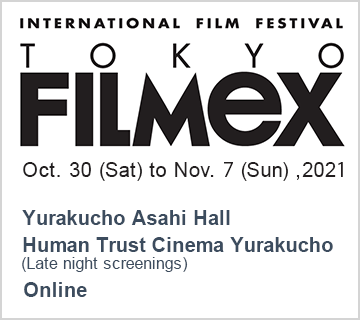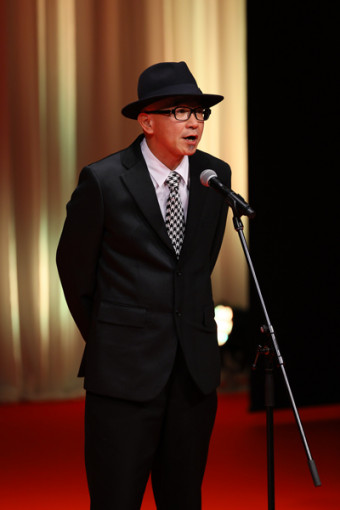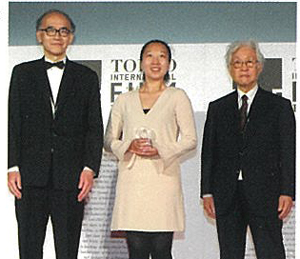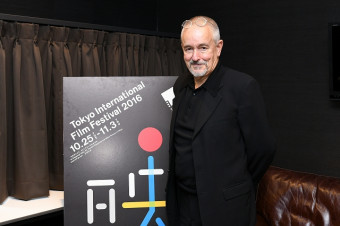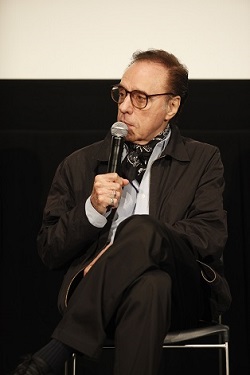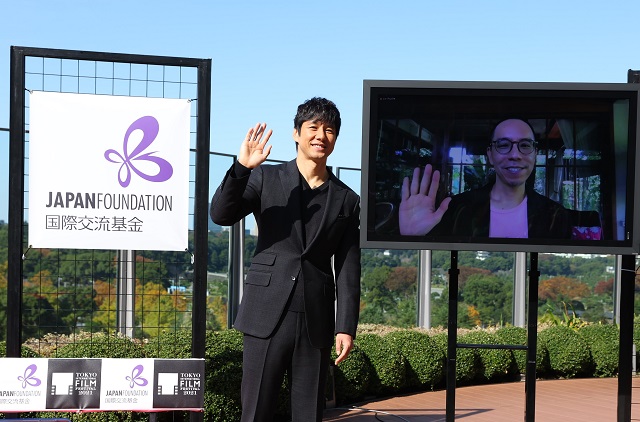
In 2020, Thai auteur Apichatpong Weerasethakul appeared during the inaugural Conversation Series at Asia Lounge and told the audience that it was his final day of post-production on a new film he had just shot in Colombia, called Memoria.
On November 5, he returned—once again virtually—to join Japanese actor Nishijima Hidetoshi and TIFF Programming Director Ichiyama Shozo in the garden at Tokyo Midtown Hibiya, a new venue at the 34th Tokyo International Film Festival. The Conversation Series, co-presented by the Japan Foundation and TIFF, brings together acclaimed filmmakers from Asia and beyond to engage in friendly dialogue with their Japanese counterparts, and is available globally via livestream.
Ichiyama mentioned that Memoria is now screening at the 34th TIFF in the Gala Selection section, and that the film, starring Tilda Swinton, won the Jury Prize at the 74th Cannes Film Festival in 2021. “Mr. Nishijima needs no introduction to viewers in Japan,” he continued, but overseas viewers may recognize the prolific actor as the star of Hamaguchi Ryusuke’s Drive My Car, winner of the Best Screenplay award at the 74th Cannes.
“Did you two see each other in Cannes?” Ichiyama asked.
“No, I’m afraid I was filming and couldn’t go,” responded Nishijima. “But we’ve known each other for more than 10 years. When one of Apichatpong’s films screened at TOKYO FILMeX, I remember we went out for dinner, and he mentioned that he had a project in mind for me.”
On that tantalizing note (more to come later), the discussion turned to Weerasethakul’s viewing of Hamaguchi’s film. Noting how disappointed he’d been not to have a chance to watch Drive My Car at Cannes, he said “But in New York, I saw it on my first day there, and the film really connected to me—not so much on an emotional level, but on an intellectual level. For me, it’s such a very sad film in the way that it’s about broken people, or [it’s about] us. We’re all broken. Watching the film is like watching vases that have broken, and the ceramic pieces have been put back together, but they’re not in their original form. The film tries to put the characters back together. I found that very moving intellectually, and it resonated with my own hidden trauma.”
He added, “I think Hide gave the best performance of his career. It was very impactful. Thank you for that performance.”
Nishijima nodded in thanks. “Drive My Car is an emotional film, but it’s meticulous structurally, so I feel it’s complete. It’s really one of the most complete films in Mr. Hamaguchi’s filmography.”
Zeroing in, Weerasethakul said, “I was attracted by the scenes of the audition, where the actors deliver the dialogue in their own languages. It’s also like pieces of memory, and it’s like pieces of fiction. I feel the character Hide plays is completely shut off after the death of his wife and then he tries to start his life again. How do you work on your character during shooting? And do you stay in character?”
Said Nishijima, “Mr. Hamaguchi kept sending me a huge quantity of texts related to the character, asking ‘What do you feel about love? About sex?’ Ten questions that he wanted me to answer as the character. Based on those texts related to my role, we would find answers. We wouldn’t act them out, but read them aloud, flatly, without emotion, as with Jean Renoir and Robert Bresson, who also followed this method in rehearsal. I found it really inspiring. The text is the foundation, my pillar.”
“Yes, I felt like the movie worked on a text-based level,” commented Weerasethakul. “Just listening to the wife repeating the text, the way she can be creative is to have sex, to reach orgasm and then the story comes out. I feel like that’s the life of the writer or filmmaker, to create narrative by stitching together life.”
Pointing out that the short story by Murakami Haruki on which the film is based is quite free of emotional charge, Nishijima said, “Mr. Hamaguchi and I had discussions about making the character more cinematic, or the audience couldn’t bear watching him for two hours—although it turned out to be three hours long. Without revealing my emotions, I still had to convey them. I had to fill my vessel with the text. It was a tough shoot.”
Asked if there was something about the character that resonated with the actor’s own life, he responded, “It was shot chronologically, and due to the pandemic, we had to take a 6-month break after the first part, when my wife dies,” he explained. “During that period of staying home, it meant a lot to me to act a role that included a death, since that was happening so much internationally [due to COVID].”
Nishijima then turned to his friend’s film. “Memoria is so silent you can hear the ringing in your ears. It seems like a sanctuary. I felt like you were going to another level. It was shot in Colombia, rather than in Thailand, and when you told me about the film before, I asked whether there would be forests in it. In Thailand, the forests seem to have spirits in them. So why did you decide to shoot there and what did you feel about the forests?”
Weerasethakul recalled that, “After I finished Cemetery of Splendour in 2015, it was quite confusing in Thailand socially and politically, because of the military dictatorship, and also in terms of the way I live. I went to many film festivals, and I felt I needed to escape. When we talk about forests, we think about the Amazon. That was my aim, but when I was [in Colombia], I was quite attracted to the city and the small towns. It’s a jungle, in a way, for me. I tried to forget Thailand and relearn filmmaking, to find new landscapes through cinema. I couldn’t escape from my way of looking at the world, but it was a new adventure. I felt like I was making the film for friends, for someone like you, who’s following and watching my work. It’s a different place but the same journey of this spirit.”
Said Nishijima, “You’ve depicted memories and dreams in the past, and those were depicted even more strongly in Memoria, especially the difference between sleep and death. Why do you always pursue those topics and themes?”
“I always think of this link between cinema and dreams,” Weerasethakul told him. “Why do we dream? Why do we need movies? It’s psychological for me, to sit in the dark and see these images. To watch a movie is to feel empathy, you become someone else, it allows you to connect with the world and become aware of the richness. Since it’s biological, I’m also always thinking about death, especially over the past year, as people close to me died. So I’m also trying to make cinema as a testament to living. We’re trying to create a testament before we pass away.”
“I’ve lost someone close to me in the past few years, and I felt death was closer to me than ever. I had no choice but to think about it. In your film, I was wondering about that character who sleeps. Does he become nothing when he’s sleeping? Does that mean he’s dead? It looked like he stopped breathing. Sleep and death, that scene left a really strong impression.”
“Tilda’s character Jessica, when he started to breathe again, asks him ‘How was death?’” responded Weerasethakul. “I think he was showing her how to confront death. When I’m talking about it in this context, it’s not negative, it’s positive. It makes us more aware of living, how to live life to the fullest. When we make movies, we’re creating a world and building a person with a soul and memories. When the project finishes, [the person is] gone. Living and dying in cinema and in life—I’m really grateful for our profession.”
Finally, the conversation turned back to the possibility that the two men would collaborate. “Hide, we need to make our dreams comes true” said the Thai director. “We’ve been trying to work together for a long time. With Tilda, we felt it wasn’t right to shoot a film in Thailand or in Scotland. We needed a foreign country where we’re both strangers. I feel the same with you. It shouldn’t be in Thailand or Japan, so the question is [where]?”
“Actually,” Nishijima laughed, “Apichatpong offered me a role in a project that takes place in a snowy field where I would have to be quite naked.”
Ichiyama recalled, “I was talking with Apichatpong at Cannes when he brought Tropical Malady, and he said the role had no lines, so anyone could play it, even a Japanese. I showed Mr. Nishijima’s photo to him and he wanted to offer him the role. So when he came to Japan, the two of you met.”
“He’s like a primitive man,” said Nishijima. “You don’t know what it’s about. But I’m already 50, and to be naked in a snowy field… it’s too much.”
Weerasethakul elaborated: “It’s a sci-fi film and it would be very expensive. I think I have to adjust the ending a bit, but I think it’s still doable.”
While the audience tried to shake off the image of a special effects extravaganza with a naked Nishijima rolling around in the snow and UFOs zooming overheard, Ichiyama began taking questions.
Asked whether the pandemic had affected the making of their films, Ichiyama took the opportunity to mention that Drive My Car was still playing in Japanese theaters after more than two months, which is unusual for an arthouse title. Maybe people are embracing it because “it’s about loss, and we could all connect with that because of COVID,” he suggested.
“It’s about a woman who’s driving me, and we’re of different ages and backgrounds,” explained Nishijima. “But somehow we connect. The character heals or can move forward through this encounter and exchange. That’s something that happened during the pandemic—we all started caring for others who are both close to us and not, so maybe that’s why people feel such a connection.”
One journalist, referencing the earlier Asia Lounge conversation between Hamaguchi Ryusuke and Isabelle Huppert in which they both expressed a great deal of confidence about their professional abilities, asked whether the two men shared the same conviction.
“There are a lot of actors and actresses who can stand in front of the camera and not be worried, but that’s not me,” Nishijima admitted. “But Mr. Hamaguchi was always there, supporting us. With a fictional character, you have to breathe life into it and that’s difficult. It’s a difficult process and everyone approaches it differently.”
Said Weerasethakul, “For me, on the set, [it’s important to synchronize] with what’s around me, not only with the actors but with the environment, because everything is an actor—even birds or concrete. Everything’s fluctuating with the wind, the sounds, everything’s moving. I try to shoot chronologically so that the actors, the crew and myself understand the trajectory of the emotions.
“I approach directing not as director-actor, but as a friendship. Especially with Thai actors, I try to rehearse, and the roles are written with them in mind. But that character Tilda plays [in Memoria] is not her. She’s not method, she’s not into being the character all the time. When I say ‘cut,’ she’s Tilda again.”
Nishijima confessed he thinks he may “unconsciously continue playing the character” throughout the duration of the shoot, but that sometimes people tell him he’s “just playing himself.”
“I think so,” Weerasethakul said. “When you’re in front of the camera, you need to put your own history and memory in the film. That’s what happens with all my actors. With Tilda, for the last scene, she dug deep into her own history. It’s not only emotionally taxing work, but physically taxing, too.”
Asked whether he would ever make a film in Japan, Weerasethakul hinted that something is coming next year, although it wasn’t clear if it would be a film or one of his acclaimed art installations. Only time—and COVID—will tell, but when Nishijima enthusiastically suggested that his Fever Room “projection performance” should be a permanent attraction at Tokyo Disneyland, the Thai auteur’s eyes lit right up.
Memoria is out in March in Japan, while Drive My Car is currently in theaters.
Guest Speakers:
Apichatpong Weerasethakul (Filmmaker)
Nishijima Hidetoshi (Actor)
Moderator:Ichiyama Shozo (Programming Director, Tokyo International Film Festival)
Conversation Series at Asia Lounge
Co-presented by The Japan Foundation Asia Center & Tokyo International Film Festival






